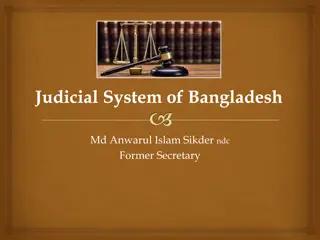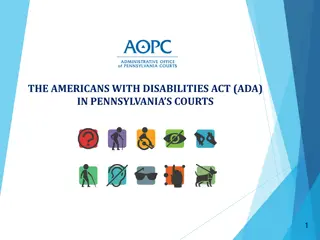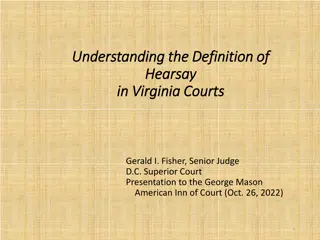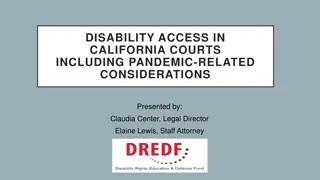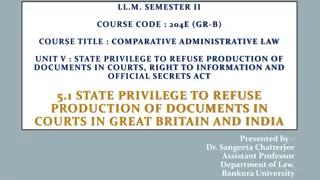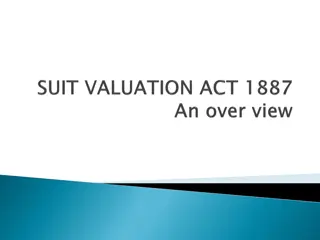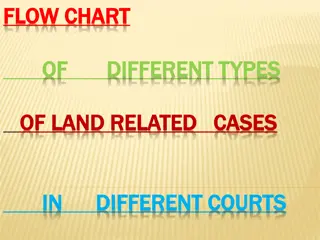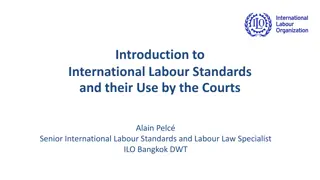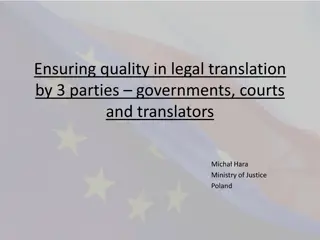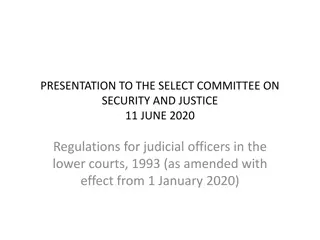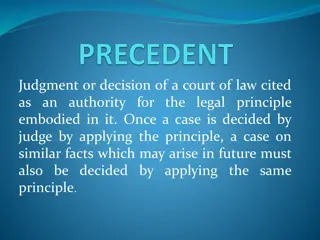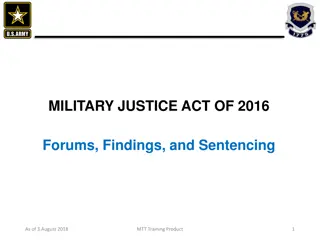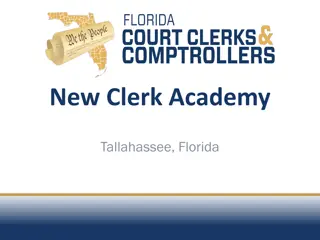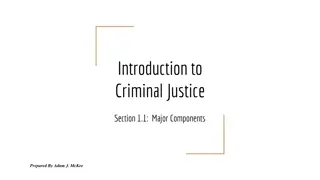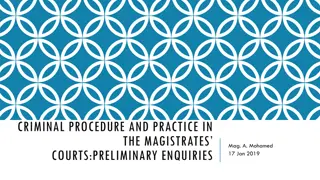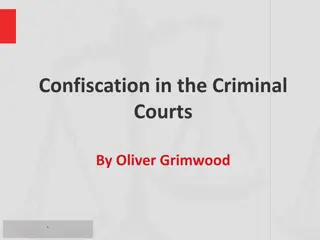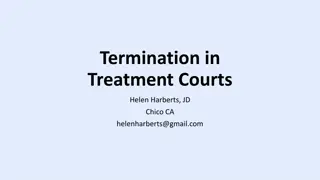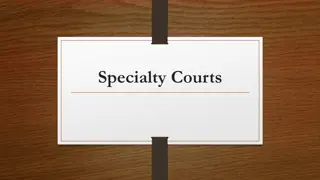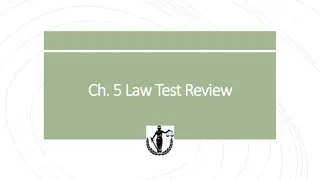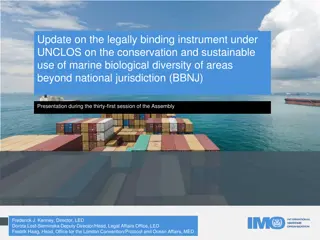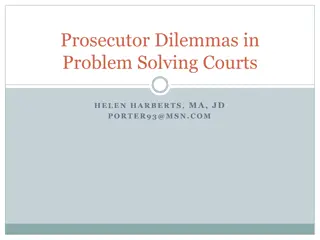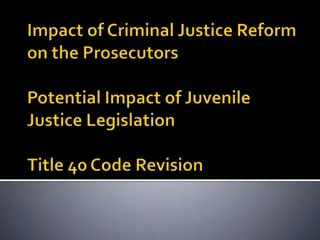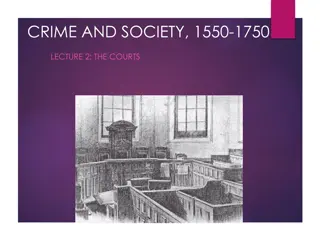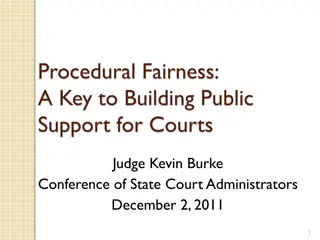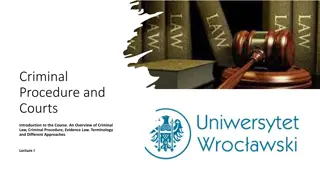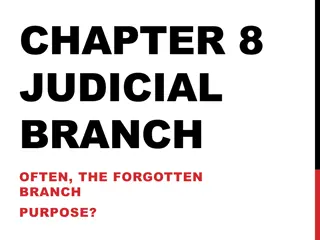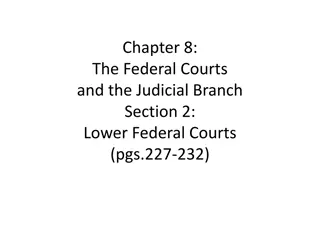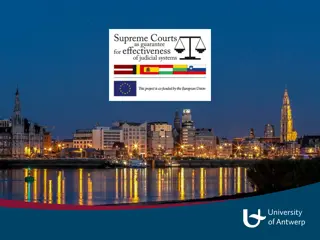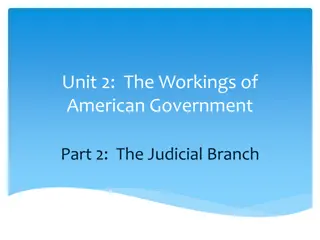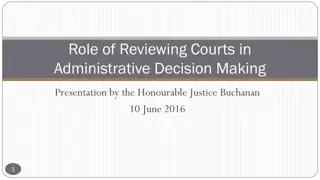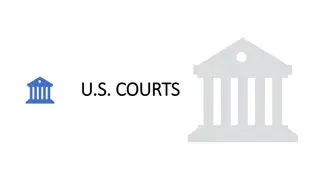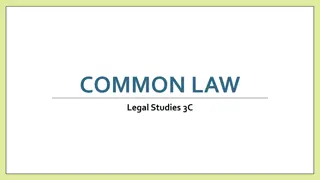Understanding the Judicial System of Bangladesh
The judicial system of Bangladesh is diverse, consisting of the Supreme Court, civil and criminal courts, courts of special jurisdiction, and more. The Constitution plays a vital role, outlining the structure and functions of the courts. From the Supreme Court to subordinate courts and tribunals, th
1 views • 37 slides
JUDICIAL REVIEW OF NATIONAL ACTION BY UNCLOS COURTS AND TRIBUNALS
International judicial review involves oversight by international courts and tribunals over the actions of States Parties in implementing their international commitments. UNCLOS courts exercise supervisory jurisdiction through grounds of review like due regard, reasonableness, necessity, and proport
1 views • 7 slides
THE AMERICANS WITH DISABILITIES ACT (ADA)IN PENNSYLVANIA’S COURTS
Title II of the Americans with Disabilities Act (ADA) ensures that no qualified individual with a disability can be excluded or discriminated against in accessing public entity services, including courts in Pennsylvania. The Unified Judicial System in Pennsylvania has policies and designated ADA Coo
0 views • 37 slides
Understanding the Role of Town and Village Courts in Municipal Governance
Explore the historical significance and impact of Town and Village Courts on municipal boards, focusing on the balance between branches of government, the importance of Justice Courts to constituents, and tips for enhancing relationships between municipalities and justice courts.
0 views • 46 slides
Understanding the Definition of Hearsay in Virginia Courts by Gerald I. Fisher, Senior Judge
Preliminary principles and rules regarding hearsay in Virginia courts, including the effective date of the Virginia Rules of Evidence, application of rules in various trial scenarios, criteria for admissibility of evidence by trial judges, and reasons for the legal distrust of hearsay evidence. The
1 views • 78 slides
Disability Access in California Courts: Pandemic Considerations and Legal History
This presentation on disability access in California courts, including pandemic-related considerations, covers relevant laws like Title II of the ADA and Section 504, historical developments such as the ADA enactment, and rules ensuring non-discrimination and accessibility in court proceedings. It a
0 views • 30 slides
State Privilege to Refuse Production of Documents in Courts: A Comparative Analysis between Great Britain and India
Doctrine of state privilege allows governments certain privileges, such as the right to refuse production of documents in courts. This privilege is recognized in both Great Britain and India, with specific statutory provisions defining its scope and application. In Great Britain, the Crown's powers
2 views • 12 slides
Understanding Ethics, Confidentiality, and HIPAA in Drug Treatment Courts
Explore the importance of ethics, confidentiality, and HIPAA regulations in drug treatment courts. Learn about the laws such as 42 CFR Part 2 and HIPAA that protect the privacy of patient records. Discover who is covered by these laws and the entities that receive federal assistance. Gain insights i
0 views • 43 slides
Understanding Suits Valuation Act 1887 and Its Purpose
The Suits Valuation Act 1887 serves to determine the jurisdiction of courts by valuing specific suits. Its purpose includes ensuring the proper forum, expediting justice, protecting rights, rectifying jurisdictional issues, and assigning relevant courts to each case. The act distinguishes between va
0 views • 24 slides
Different Types of Land Related Cases Flow Chart in Various Courts
Explore the flow chart depicting various types of land-related cases in different courts, from land disputes in civil court to appeals in district court and high court, all the way up to special leave petitions and curative petitions at the Supreme Court. The chart outlines the progression of cases
0 views • 9 slides
International Labour Standards: Overview and Application by Courts
This document explores the adoption and implementation of international labour standards by the International Labour Organization (ILO), focusing on their use by domestic courts. It covers the basic features, composition, and significance of ILO conventions and recommendations, emphasizing their tri
0 views • 28 slides
Ensuring Quality in Legal Translation by 3 Parties: Governments, Courts, and Translators
Explore the importance of quality legal translation involving governments, courts, and translators in criminal proceedings. The European Union's Directive on interpretation and translation aims to facilitate communication across Member States. Governments play a key role in regulating the translatio
0 views • 20 slides
Regulations for Judicial Officers in Lower Courts: Presentation to Select Committee
This presentation outlines the regulations governing judicial officers in lower courts, focusing on leave categories, vacation leave provisioning, and the vacation leave cycle. It highlights the historical background, the Magistrates Act of 1993, and the recent amendments effective from January 1, 2
4 views • 26 slides
Understanding Judicial Precedents and Their Significance in Legal Practice
Judicial precedents are decisions of a court of law that serve as legal authorities for future cases with similar facts. They establish principles to be followed by lower courts until overruled. Examples from England and India illustrate the importance and applicability of precedents in the legal sy
0 views • 16 slides
Overview of Military Justice Act of 2016 and Court-Martial Proceedings
This comprehensive overview covers the Military Justice Act of 2016 and various aspects of court-martial proceedings, including different types of courts-martial, required votes for findings and sentencing, changes in special court-martial procedures, and more. The content delves into the specific c
0 views • 44 slides
Understanding the Role of the Clerk in the Courts
This informative content delves into the essential role of the Clerk in the courts, outlining their responsibilities, duties, and obligations. It explores the importance of maintaining court records, collecting fines and fees, and interacting with various court partners. The article also covers diff
0 views • 22 slides
Overview of Criminal Justice System Components in the United States
The criminal justice system in the United States comprises various systems at state and federal levels. It consists of major components - Police, Courts, Corrections - bound by the Rule of Law and the Constitution. The Courts interpret laws and uphold civil liberties, with remedies available for vio
0 views • 28 slides
Guide to Preliminary Enquiries in Magistrates' Courts
The guide provides insights into the legislative framework governing Preliminary Enquiries, procedures, and the duties of counsel in Magistrates' Courts. It discusses the challenges faced, emphasizes timely case management, and offers practical tips for effective handling of cases. The importance of
0 views • 11 slides
Confiscation in the Criminal Courts: A Guide to Proceeds of Crime Law
Confiscation in the criminal courts involves depriving defendants of benefits gained from criminal conduct within their means. The Proceeds of Crime Law in the Cayman Islands sets guidelines for these proceedings, emphasizing that confiscation is not a form of punishment but aims to recover obtained
3 views • 17 slides
Cultural Awareness for Drug Courts Working with Native American Participants
Understanding the cultural nuances of Native American communities is crucial for Drug Courts collaborating with Tribal Healing to Wellness Courts. This involves acknowledging tribal sovereignty, regional and cultural differences, customs, spirituality, and communication styles unique to American Ind
0 views • 22 slides
Understanding Termination in Treatment Courts
Explore the complexities of termination in treatment courts with discussions on types of termination, when to terminate, and the considerations involved in the process. Learn about successful and unsuccessful terminations, the judicial decision-making process, and the importance of careful evaluatio
0 views • 19 slides
Specialty Courts and Recidivism Rates in the United States
Specialty Courts, such as Drug Courts and Problem-Solving Courts, provide intensive behavioral supervision and treatment for substance abuse and mental health issues. These courts aim to reduce recidivism rates and engage criminal offenders in therapeutic interventions. Nevada is actively running 42
1 views • 14 slides
Understanding Jurisdiction and Court Systems: Law Test Review
Explore the concept of jurisdiction in the legal system, from the powers of courts to the different types of courts like admiralty and appellate courts. Learn about the structure of the federal courts in the U.S. and the functions of the Supreme Court. Gain insights into the specialized jurisdiction
2 views • 41 slides
Understanding the Judicial Branch of the Federal Government
The Judicial Branch, as the third branch of the federal government, ensures fair law enforcement and interprets laws through criminal and civil cases. Federal courts were established to address issues of state-based justice disparities. The judiciary system comprises district courts for trials, circ
1 views • 34 slides
Update on Legally Binding Instrument under UNCLOS for Marine Biological Diversity Conservation
United Nations General Assembly is developing a treaty under UNCLOS for conservation of marine biological diversity in areas beyond national jurisdiction since 2015. The objective is sustainable use of marine genetic resources, area-based management tools, environmental impact assessments, capacity-
1 views • 18 slides
Introduction to Cruise Ships in the Tourism Transport Industry
Cruise ships are passenger vessels designed to offer a complete tourist experience with cabins and entertainment facilities. This chapter explores the significance of cruise products in providing transportation, accommodation, and leisure services aboard, emphasizing the experiential aspect over the
0 views • 10 slides
Challenges and Innovations in Problem-Solving Courts
Helen Harberts, a skilled MA and JD with expertise in problem-solving courts, delves into the dilemmas faced by prosecutors in these courts. Through in-depth insights and thought-provoking questions, the narrative explores the effectiveness of traditional responses to addiction-based offenses, publi
0 views • 65 slides
Impact of Criminal Justice Reforms on State Courts and Prosecutors
Changes in crime classifications and sentencing laws, along with the emphasis on Accountability Courts, are reshaping the criminal justice landscape in the state. Key changes include alterations to theft, burglary, and controlled substance laws, impacting the workload of state courts and prosecutors
0 views • 20 slides
Virtual Town Hall Monroe County Problem-Solving Courts: Stories and Statistics
Explore the Virtual Town Hall hosted by Viterbo University VOICE Initiative and Monroe County, focusing on Problem-Solving Courts. Learn about the initiatives, perspectives, and impacts of Drug Treatment Court, OWI Treatment Court, and Family Reunification Court. Gain insights from key figures like
0 views • 23 slides
Crime and Society, 1550-1750: Courts and Legal System Overview
The lecture covers the courts and legal system during the period of 1550-1750, focusing on the role of the monarch, Parliament, King's Bench, Court of Common Pleas, Assizes, Old Bailey, and local courts like Quarter Sessions. It highlights the hierarchy and functions of different courts in dealing w
0 views • 19 slides
Understanding Public Perceptions of Courts and Judges
Exploring public opinions on procedural fairness in courts, this content discusses the influence of judges' political views, aspirations for higher courts on their impartiality, and the divided nation on interpreting the Constitution. It also highlights the complexities of public knowledge about the
0 views • 24 slides
Introduction to Criminal Procedure and Courts: Overview and Terminology
This piece provides an introduction to a course on Criminal Procedure and Courts, covering topics such as criminal law, evidence, courts, and international legal bodies. It outlines the exam format, information on lecturers, and essential knowledge needed for the course. Additionally, it shares insi
0 views • 28 slides
Understanding the Judicial Branch of the United States
The Judicial Branch, often overlooked, plays a crucial role in interpreting and applying laws fairly. It was established under Article 3 of the Constitution with the dual system separating state and federal courts. The Judiciary Act of 1789 proposed a three-tiered court system, including District Co
0 views • 31 slides
Understanding the Federal Court System in the United States
The Federal Court system in the United States comprises District Courts, handling a vast number of cases each year, with each district having multiple judges. These courts have jurisdiction over a range of cases, including civil rights violations, employment disputes, criminal offenses, and bankrupt
0 views • 11 slides
Role of Supreme Courts in Ensuring Effective Judicial Systems in the European Union
This communication focuses on the vital role of Supreme Courts in guaranteeing the effectiveness of judicial systems within the European Union. It delves into the significance of courts' communication strategies, emphasizing accessibility of justice, trust-building, and public image. The discussion
0 views • 29 slides
Overview of Courts and Legal System in Greece
The legal system in Greece is structured around ordinary and special courts, with judicial power vested in the courts of law. The system includes ordinary civil, criminal, and administrative courts, along with special courts for specific cases. The three jurisdictions - civil, criminal, and administ
0 views • 22 slides
The American Judicial Branch: Structure and Judicial Review
The American judicial system consists of District Courts, Appellate Courts, and the Supreme Court. District Courts handle initial cases, Appellate Courts hear appeals, and the Supreme Court is the highest authority. Justices are nominated by the President and confirmed by the Senate. Judicial review
0 views • 12 slides
Role of Reviewing Courts in Administrative Decision Making Presentation
The presentation by the Honourable Justice Buchanan on the role of reviewing courts in administrative decision-making highlights key legal cases and principles. It explores the delicate balance between judicial review and administrative decision-makers' discretion, emphasizing the importance of proc
1 views • 38 slides
Understanding the U.S. Court System: Jurisprudence and Structure
Law enforcement officers play a crucial role in the criminal justice system by understanding criminal jurisprudence and the court system's structure. This includes knowledge of different court levels, jurisdiction, and the adjudication process. The duality of courts, such as adult vs. juvenile court
0 views • 43 slides
Overview of Legal System in Australia
This content covers various aspects of the legal system in Australia, including common law, sources of law, court hierarchy, appeals process, federal courts, and the importance of judicial independence. It outlines the key components of the legal framework, such as the role of Parliament, judge-made
0 views • 36 slides
